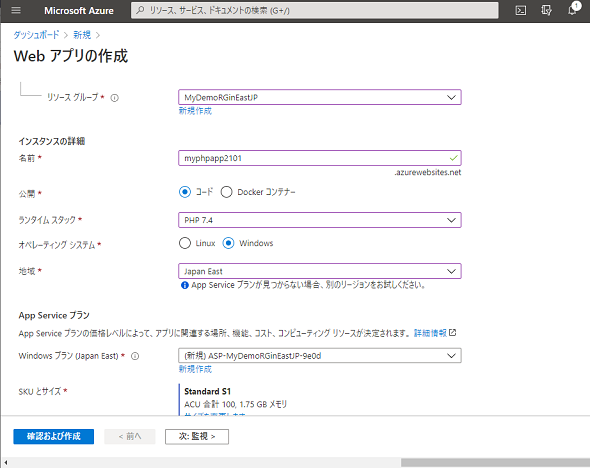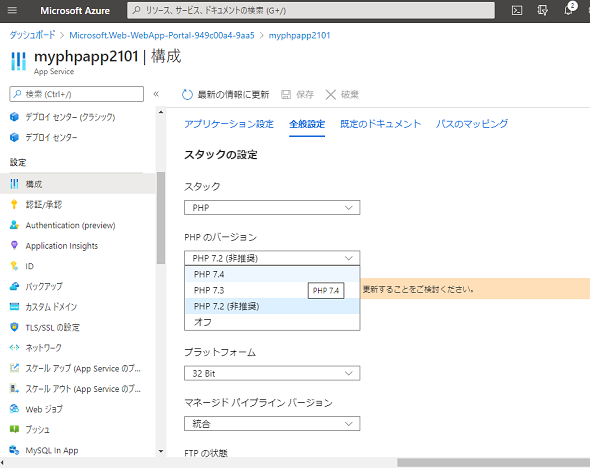Microsoft Azure Latest Features Follow-up (132)
"PHP" is a scripting language for web apps that has been popular for a long time. Initially, it was often used in combination with the Apache web server on Linux, but it has long been supported by Windows IIS. The latest version "PHP 8.0" was released on November 26, 2020, but Microsoft has no plans to support this version.
This article is for members only. You can see all by registering as a member (free of charge) .
Microsoft Azure latest feature follow-up
A long relationship between IIS and PHP
"PHP" has officially supported Windows "Internet Information Services (IIS)" as a Web server platform for a long time. It all started in March 2007 when Zend Technologies provided "FastCGI for IIS" (Zend Core 2.0) as a result of a technical partnership with Microsoft.
FastCGI for IIS officially supports Windows platforms from IIS 5.0 (installed in "Windows 2000 Server"), and FastCGI module is now standard equipment from IIS 7.0 (installed in "Windows Server 2009"). rice field.
PHP is one of the run-time stacks officially supported by Azure App Service. Azure App Service officially supports the versions of PHP for which official support and extended support are provided for Linux and Windows, respectively ( Screen 1 ).
 Screen 1 Azure App Service officially supports PHP versions on Linux and Windows during the official and extended support period.
Screen 1 Azure App Service officially supports PHP versions on Linux and Windows during the official and extended support period.As for the minor version, when the extended support ends, it will automatically move to the successor version while maintaining the SLA (Service Level Agreement). To avoid compatibility issues, it is recommended to test and manually switch to the successor version before the automatic migration takes place ( Screen 2 ).
 Screen 2 If you are using PHP 7.2, it is recommended that you test the compatibility to see if there are any issues before the automatic upgrade to "February 1, 2021".
Screen 2 If you are using PHP 7.2, it is recommended that you test the compatibility to see if there are any issues before the automatic upgrade to "February 1, 2021".Microsoft does not support PHP 8.0 for Windows
Currently, PHP 7.2 / 7.3 / 7.4 for Windows and Linux are officially supported, and as of January 2021, only these versions can be newly deployed. Most recently, extended support for PHP 5.6 and PHP 7.2 will end on February 1, 2021 ( Table 1 ).
| PHP version | Official support end date | Extended support end date | OS support | |
|---|---|---|---|---|
| Linux | Windows | |||
| PHP 5.6 | January 1, 2019 | February 1, 2021 | ○ ○ | ○ ○ |
| PHP 7.0 | December 3, 2018 | February 1, 2020 | ○ ○ | ○ ○ |
| PHP 7.1 | December 1, 2019 | February 1, 2020 | ○ ○ | ○ ○ |
| PHP 7.2 | November 30, 2020 | February 1, 2021 | ○ ○ | ○ ○ |
| PHP 7.3 | December 6, 2020 | December 6, 2021 | ○ ○ | ○ ○ |
| PHP 7.4 | November 28, 2021 | November 28, 2022 | ○ ○ | ○ ○ |
| PHP 8.0 | November 26, 2022 | November 26, 2023 | ○ (planned to be supported) | × |
| Table 1 PHP support status and support deadline for Azure App Service (PHP 8.0 is not supported as of January 2021) | ||||
If you are deploying a PHP 7.1 web app, it will be upgraded to PHP 7.3 on the end of extended support, but PHP 5.6 deployments will no longer be supported and will remain unpatched vulnerabilities. Please note that it will be. You need to manually migrate to PHP 7.3 or later.
If you are using the Windows version of PHP, there are more important points to keep in mind. That is, Microsoft does not support "PHP 8.0" on Windows platforms. This policy was announced in July 2020.
This does not mean that the Windows binaries for PHP 8.0 will not be provided. PHP 8.0 was released on November 26, 2020, but the PHP for Windows website provides the PHP 8.0 binaries for Windows. Microsoft does not support PHP 8.0 on cloud services such as IIS on Windows and Azure App Service.
Therefore, if you are using the Windows version of PHP in your Azure App Service app, there is a risk of unpatched vulnerabilities after "November 28, 2022" when the extended support for PHP 7.4 ends. The app will remain as it is. By then, it will be necessary to take measures such as migrating to the Linux version of PHP 8.0 or later.
About the author
Ryo Yamaichi
Lives in Hanamaki City, Iwate Prefecture. Microsoft MVP: Cloud and Datacenter Management (2020-2021). After working as an SIer, an IT publisher, and a system administrator for a mid-sized company, became a freelance technical writer. Focusing on Microsoft products and technology, he contributes articles to IT magazines and websites, creates documents, and collects case studies. My personal blog is " Yamaichi Ryo no Enu Somehow World ". Recent publications include " Introduction to Docker & Windows Container Technology for Windows " (Nikkei BP) and " Windows Troubleshooting Commands & Techniques for IT Professionals " (Nikkei BP).
Copyright © ITmedia, Inc. All Rights Reserved.








0 コメント:
コメントを投稿